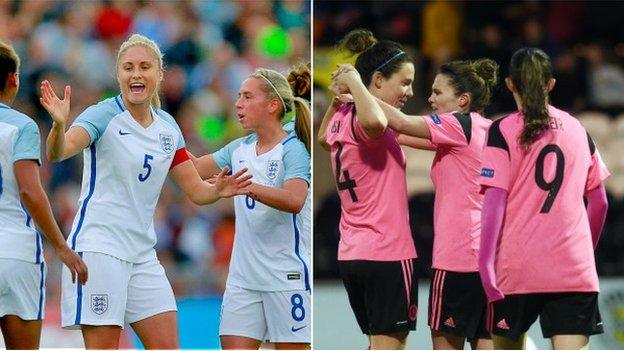Women's Euro 2017: How has women's football progressed across Europe?
- Published
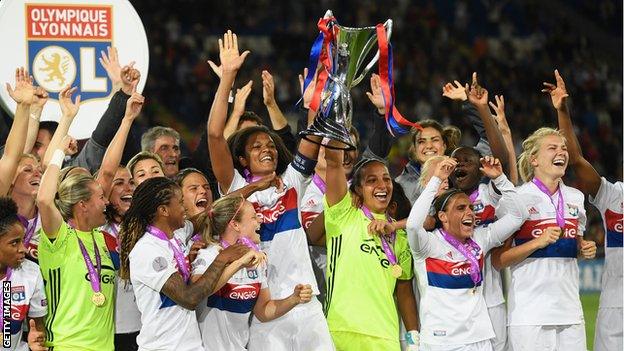
Lyon have won back-to-back Women's Champions League titles - and four in total since 2011
Uefa Women's Euro 2017 |
|---|
When: 16 July - 6 August Where: The Netherlands BBC Coverage: Live commentaries on BBC Radio 5 Live, Scotland games on Radio Scotland and online, plus live text coverage on the BBC Sport website |
It is only four years since the previous Women's Euros ended with Germany as champions. Yet between then and now, and with Euro 2017 about to start, the European women's game has changed to the point that it is scarcely recognisable.
Remember Swedish side Tyreso, German club Turbine Potsdam or French outfit Juvisy?
All those teams reached European semi-finals within 12 months of Euro 2013 - a tournament that came in a year when Manchester City did not have a Women's Super League side and a crowd of less than 5,000 watched the Women's FA Cup final at Doncaster's Keepmoat Stadium.
Fast forward to 2017 and Barcelona, Paris Saint-Germain and Manchester City were all in the last four of the Women's Champions League, arriving fashionably late to a party that is just getting started.
And with the well-financed emergence of those clubs, the European women's game, dominated for so long by Scandinavian and German trailblazers, now feels closer to mirroring the men's game - on a branding level - than ever before.
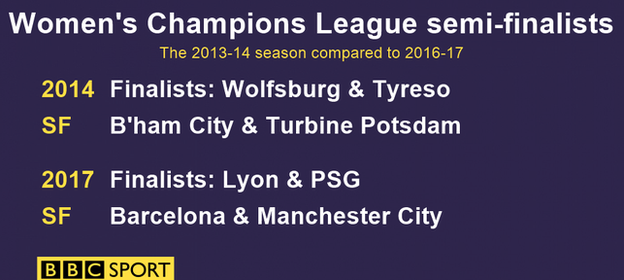
"When Chelsea, Manchester City, Barcelona, PSG and Lyon took the decision to put effort into the women's game, that was a huge decision for women's sport," Iceland Women head coach Freyr Alexandersson told BBC Sport.
"Just marketing-wise, it's very, very important, but also sports-wise, bringing their facilities and knowledge to the women's game is just vital. The game has grown hugely in the past five years.
"In the Women's Champions League, and also in the biggest leagues - in France, Germany and England - the best teams are getting better every year."
So, as some of the supposed bigger names are starting to take women's football seriously, how far has the game really progressed on the continent, and just how healthy is the state of women's football in some of the nations competing in Women's Euro 2017?
Italy - The Old Lady emerges as newest team
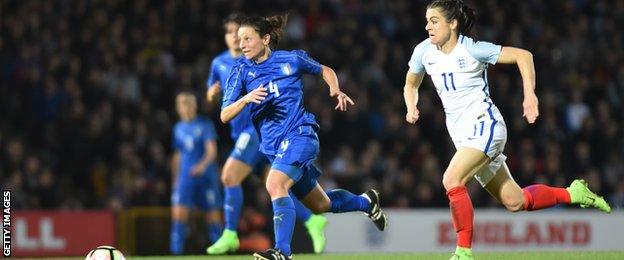
Italy held England to a 1-1 draw in an international friendly at Vale Park in April
Of the 12 teams in the women's Serie A in 2016-17, just three were run on a professional budget: Verona, Brescia and new champions Fiorentina.
However, men's Champions League finalists Juventus announced their intention to launch a women's team in June, and they will land straight in the top tier.
On 1 July, the Turin club revealed they had bought, external the rights to existing top-flight club Cuneo Calcio Femminile, meaning they can compete in Serie A in 2017-18.
Previously, Fiorentina - who lifted their first title in May after adopting ACF Firenze in 2015 - were the only top-flight side to be formerly affiliated with a men's Serie A namesake, with the rest relying on third-party sponsorship.
Italy's top two sides qualify for the Women's Champions League each year, although the country has never produced a finalist, with only Verona reaching the semi-finals, in 2007-08.
Spain - Barca in talks over unprecedented US move
Barca a perfect move for me - Duggan
Barcelona became Spain's first women's side to reach the last four in Europe this term.
Greater domestic competition in recent years has prompted the Catalan club to bolster their investment significantly since 2016, re-signing Spain midfielder Vicky Losada from Arsenal in November.
Earlier this month, they grabbed headlines across the continent with the signing of England striker Toni Duggan from Manchester City, making a clear statement of their intent to win European silverware.
Real Madrid have also revealed their intention to get a women's team started.
But whether that will lead to a female El Clasico remains unclear on both sides, as Barcelona are in talks with the American National Women's Soccer League about entering a team for 2018.
Having opened a permanent office in New York in September, Barca want a team in the US to expand their women's football pedigree.
France - crowds soar at dominant big two
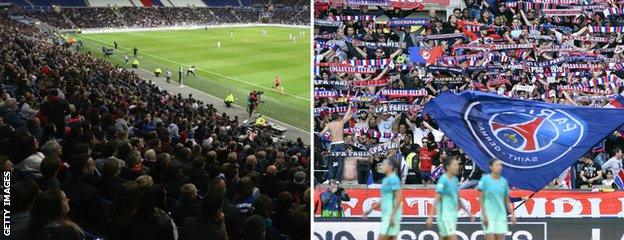
A crowd of 19,214 saw Lyon host Manchester City in their Women's Champions League semi-final, while 19,192 were at Parc des Princes (right) for Paris St-Germain v Barcelona
Another rapidly-changing aspect of the women's game in Europe is attendances, with Lyon and Paris Saint-Germain leading the way in France, playing games at the regular homes of their men's counterparts - in contrast to the non-league men's grounds commonly used in England.
Nevertheless, the American NWSL - with average attendances over 5,000 in 2016 - remains far better-supported overall than any league on this side of the Atlantic.
With a reported annual budget, external of eight million euros, Lyon are the best-funded women's team in Europe and rewarded their financial backers with their fourth Champions League title in Cardiff in June.
Lyon and France captain Wendie Renard said it was "no coincidence" that two French sides made that final, with the investment being made. However, questions remain about the resulting competitiveness of the French top flight overall, as Lyon have claimed 11 consecutive domestic titles and they won an ominous seven league matches by six or more goals in 2016-17.
Germany - Bayern and Wolfsburg enjoying Bundesliga reign
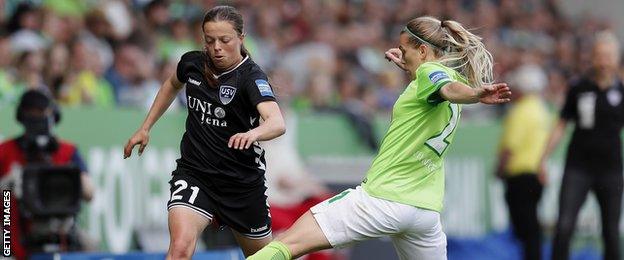
Nearly 70% of games in the 2016-17 Frauen Bundesliga were either drawn or settled by a one-goal margin, compared to just 50% in the English WSL 1 Spring Series
The Frauen Bundesliga, previously dominated by Turbine Potsdam, FFC Frankfurt and FCR 2001 Duisburg, has seen Bayern Munich and Wolfsburg occupy the top two spots since 2014-15.
Compared to other European countries, German sides have long been backed with greater finances and, of the past 16 women's European champions, nine have been German clubs.
However, the emergence of Lyon in recent years has seen the Germans challenged from outside Scandinavia for the first time - with the exception of Arsenal Ladies' 2007 quadruple-winning side - and the power-shift has attracted players across the Franco-German border.
Germany captain Dzsenifer Marozsan now plays her club football for Lyon after leaving Frankfurt in 2016, while Norway striker Ada Hegerberg - winner of the Uefa Best Women's Player in Europe Award for 2016 and the BBC Footballer of the Year for 2017 - left Turbine Potsdam for the French champions in 2014.
Netherlands - Part-time clubs the norm for Euro 2017 hosts
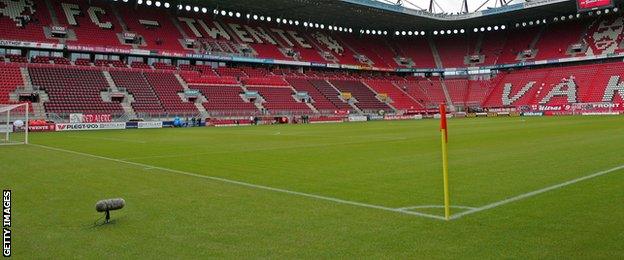
FC Twente's stadium in Enschede, with a capacity of 30,000, will host the Euro 2017 final on 6 August
Tickets have sold out for all of the Netherlands' group-stage games at the Euros, as the country hosts the tournament for the first time.
But Dutch top-flight sides do not yet train on a completely full-time basis, prompting some of the nation's best players to move abroad, including star striker Vivianne Miedema, who now plays for Arsenal.
"In Holland, our league is OK, but the English league - that's the next level for our players," prominent Dutch women's football agent Leoni Blokhuis told BBC Sport.
Two of Blokhuis' clients - Siri Worm and Marthe Munsterman - recently joined promoted WSL 1 side Everton Ladies from Dutch side FC Twente.
"In Holland, players train in an amateur complex," Blokhuis added. "But when they're at Everton, they are training at the same complex as the men. That's amazing for the girls.
"They can be fully professional in England, arriving at the club in the morning, eating breakfast and lunch at the training ground. But in Holland, the salary is not enough for you to live off it alone."
So when might the Women's Eredivisie reach a stage when clubs can train on a full-time basis?
"That's quite a long way off," Blokhuis replied. "The support level from the men in the Dutch clubs isn't always there. It's not important for the club. They don't give the girls priority.
"But this is the quickest-growing sport in Holland. There are more than 153,000 girls and women playing football in the country. When the clubs' boards are more enthusiastic, that's the starting point."
England - WSL 'is the league of the future'
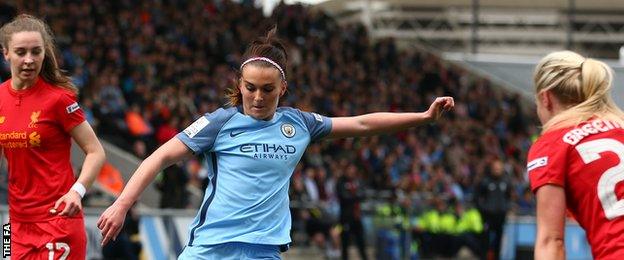
In 2016, Manchester City became Britain's first women's club to average crowds of more than 2,000 across a season
The Women's Super League is attracting more overseas stars than ever before - including the Fifa World Player of the Year Carli Lloyd - as it emerges as a destination of choice for world-class players.
"Germany is still the best league because all the clubs can beat each other, but the league in England is the league of the future," Blokhuis continued.
"The Football Association is paying the English international players so, with a club salary as well, some players can earn a lot of money overall."
However, only seven WSL sides can claim to have absolutely all of their players training on a full-time basis, and some clubs have struggling financially, most notably with top-flight side Notts County folding on the eve of the 2017 Spring Series.
In terms of television deals, wage packets and sponsorship, the women's game remains men's football poorer relative. Yet in branding terms - with Chelsea, Manchester City, Arsenal and Liverpool the top four in the WSL 1 Spring Series - the likeness is now undeniable after rapid changes over the past four-year international tournament cycle.
- Published1 June 2017
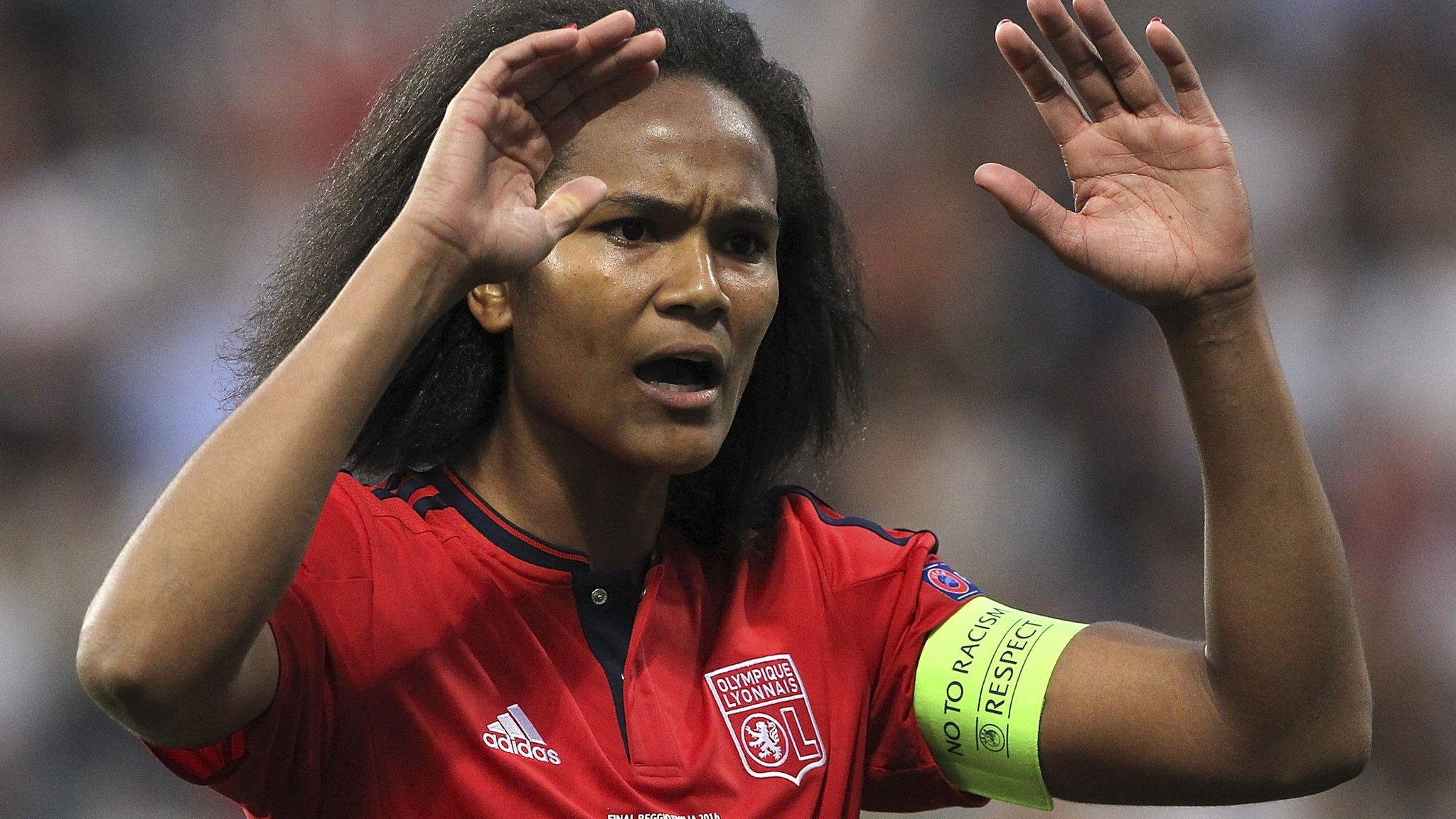
- Published6 July 2017
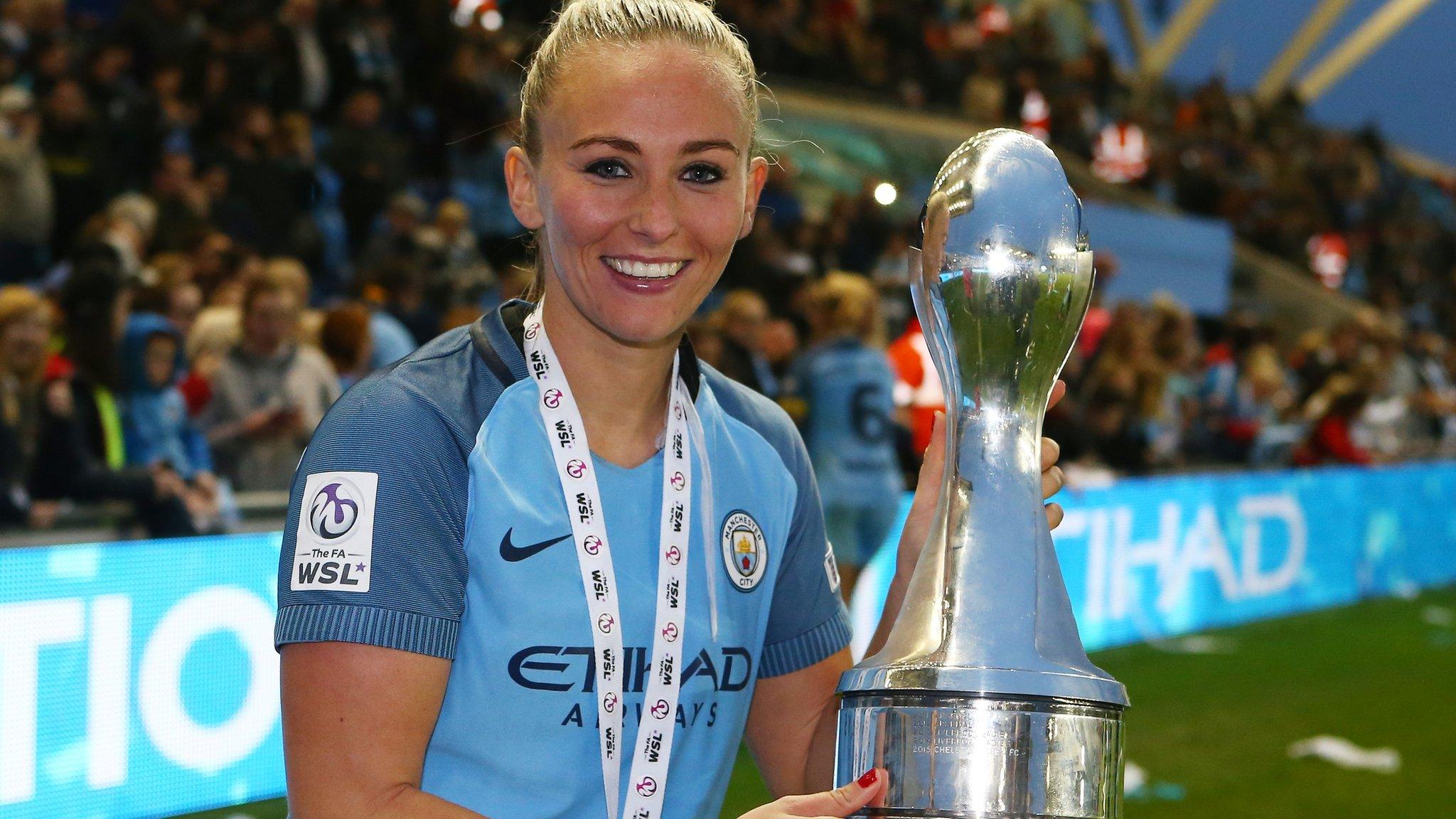
- Published8 November 2016
